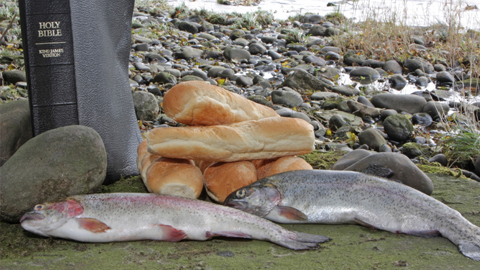One of Jesus’ best known miracles is the feeding of the 5,000. (Remember the child who shared two fish and five loaves of bread – Matthew 14:13-21?) Someone said to me recently, if Jesus were alive today, he probably wouldn’t be allowed to get away with half the miracles he performed! It’s not just that we live in such a skeptical, litigious age … it’s all that red tape as well.
A crowd had followed Jesus out into the wilderness, and it would be getting dark soon. Concerned, the disciples came to Jesus and said, “This is a remote place, and it’s already getting late. Send the crowds away, so they can go to the villages and buy themselves some food.”
Jesus replied, “They do not need to go away. You give them something to eat.”
Well, you can imagine the disciples’ surprise when Jesus said that? He wants us to do what?
“We only have five loaves of bread and two fish,” they answered.
“Bring them here to me,” he said. And he directed the people to sit down. It is obvious that Jesus is in charge of the situation. “Have the people sit down,” he said.
Taking the five loaves and the two fish, Jesus looked up to heaven and gave thanks and broke the loaves. Then he gave them to the disciples, and the disciples gave them to the people. They all ate and were satisfied, and the disciples picked up twelve baskets full of broken pieces that were left over.
What an amazing story! Let’s look at a few truths here …
First, Jesus’ concern for the multitude: Matthew begins this story by saying, “When Jesus landed and saw a large crowd, he had compassion on them and healed their sick..” Nothing new in that. Throughout the Gospels he shows compassion to everyone – the least and the lowest.
Jesus came with one purpose and desire to seek and to save all people. When he gazed out over Jerusalem, he wept. Why? He knew the heartaches, the headaches and the hungers that go with being human. The compassionate Christ cares for each and every one. (No one is left out.)
Actually, to really appreciate the compassion Jesus had for the multitude, remember how the story actually begins: “When Jesus heard what had happened to his good friend, he withdrew by boat privately to a solitary place. Hearing of this, the crowds followed him on foot from the towns..” Did you catch that? “When Jesus heard what had happened and withdrew to a solitary place.”
What was it that happened? If we go back a few verses we discover that Jesus’ cousin, John the Baptist, had been beheaded by King Herod. How do you think Jesus felt when he got this news? How would you feel? A family member that you were very close to has been the victim of an atrocious crime. No wonder Matthew said that Jesus withdrew to a solitary place. Don’t you think that maybe Jesus wanted to be alone to grieve the death of his cousin? But then Matthew adds, “Hearing of this, the crowds followed him on foot from the towns.”
Jesus can’t even have a few moments to grieve. If this had happened to me, the last thing I would feel like is seeing a crowd of people coming to me for help. But that’s me … and perhaps that’s you … but that’s not Jesus. Jesus had compassion for the crowd. And he still looks at us with that same compassion today.
But there is a second thing we need to see: not only does he have compassion, but he’s also capable. Jesus is competent to do for us more than we can even imagine.
Many people have tried to give a rational explanation for the miracle of the fishes and loaves. When they do that, they miss the point. The important point of this story is that Jesus is able to supply our needs, no matter how he does it. Our needs may be physical or emotional or spiritual, but Christ is sufficient.
But there’s one more thing that needs to be said: Jesus uses what we give him to work with.
What if that young boy hadn’t been willing to share his five loaves and two fish? I think Jesus would still have found a way to feed the multitude, but there seems to be a clear principle of faith that God works with what we have – and what we give.
In 2 Kings 4, there is a woman whose husband had died, and the creditors were coming to take away her sons as slaves for payment. She cries out to the prophet Elisha for help. Elisha’s response is to ask her a question, “What do you have in your house?”
All she had in the cupboard was a little oil – but when she took it and put it in the hands of God, a miracle happened, and her needs were met. Whenever we have a need, or someone we care about has a need, the first question we need to ask is, “What do I have in my house?”
Are there some fishes and loaves or some oil that God could use in a miraculous way? Before you answer, think about what you have for a moment. It might be some material possession. It might be some talent. Something that God can use to meet someone else’s need?
Rev. Dan Koeshall is the Senior Pastor at The Metropolitan Community Church (The Met) in San Diego, California, themetchurch.org.












